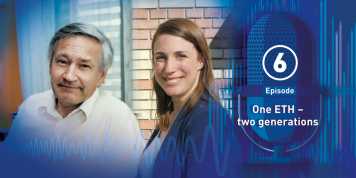The problem-solver
Julia Wysling combines a flair for numbers with social engagement to help society progress. The mathematician and former VSETH president simulates and optimises pedestrian flows.

Even as an infant, Julia Wysling counted streetlights from her pram. At least that’s the story her father – a journalist who still can’t quite understand his daughter’s flair for numbers – likes to tell. Wysling was always better with numbers than words. “I began attending high school after year six rather than year eight; that way I didn’t have to pass a French exam.” The logical and rational are what have always truly fascinated her. “It’s more about right and wrong,” she says, “with less scope for discussion.”
So Wysling, who is now 28, decided more than ten years ago to attend a high school specialising in maths and science. It was a very conscious decision on her part. “I had a teacher who was convinced that women had no place in the world of science and who used to mark me down because of that.” But that only made her more determined: “I wanted to prove him wrong.” If he knew the career Wysling has made for herself, he’d have to admit she was right.
After leaving school, Wysling enrolled as a maths student at ETH Zurich. But her true desire was to combine numbers with something more socially oriented. The student advisory service recommended psychology. “But I found that a bit far-fetched.” So, in the end, it was just plain maths. And why did she choose ETH? “That wasn’t a rational decision – which is not at all typical for me.”
Wysling’s mother had studied pharmacy at ETH and often raved about what a great time she’d had. Although Wysling initially toyed with the idea of studying abroad, when she saw how ETH scored in international university rankings, it was a clear-cut case. “Why wander far from home, when the good things are just around the corner?”
Never a dull moment
Zurich-born Wysling has never regretted her decision – even though she would probably make a different choice today. “I think structural engineering or computer science would have suited me as well.” But she felt right at home in the company of mathematicians. Although the majority of students were men and she was sometimes the only woman in small lectures, she never felt out of place. “Mathematicians are very sociable.”
In this environment, Wysling was also able to fulfil her desire to do something for society. Even during her Bachelor’s course, she did volunteer work on the board of the VMP, the association of maths and physics students, helping organise events. After one year, she was president of the association and organising events for VSETH, the Association of Students at ETH – all on top of her own studies and part-time job as an assistant in the maths library. “My studies did suffer a bit sometimes.” But it also granted her flexibility and a lot of freedom. “You just have to tackle every day as it comes.” As a counterweight to all the studying, working and volunteering, Wysling did a lot of sport. “I stumbled upon triathlon as a student.” But it was only ever a pastime. “For me the only competitive element was improving my own performance.”
“In my job I can apply mathematics in real life and, at the same time, add value for society.”Julia Wysling
In 2013, however, she was no longer able to reconcile her studies with her volunteer work: after being elected VSTEH president, she took a year off from her Bachelor’s degree. It was a year in which she learnt an amazing amount – about interacting with people, communicating, coordinating, managing and problem-solving. It was no easy task representing 15,000 people in diverse fields of study and from different backgrounds, but Wysling mastered it by thinking and arguing rationally. As she says today: “I believe it’s better to have problems you can solve than to lead a boring life devoid of challenges.”
Dabbling in politics
During her time as VSETH president, a highly political position, her high-school experiences stood her in good stead. “The kids in my class all had a keen interest in politics. If you wanted to be part of the conversation, you had get interested too.” Her pronounced flair for politics led her to run for the Zurich city council as a candidate for the Social Democratic party. It doesn’t bother her that she wasn’t elected. “I simply wanted to take a look at how politics really works.” Her conclusion: “People often don’t argue rationally. That was a bit of a shock for me.”
After a year off to run VSETH, Wysling turned her focus to her studies again. The ETH alumna doesn’t consider that year to be wasted time. “I experienced so much and learned a lot for my future life.” The same was true of her three-semester stint on the Femtec career-building programme – a programme designed to encourage female engineering and science students, preparing them to enter the working world and take on management roles.
After completing her Master’s, Wysling had no intention of pursuing a career in research. “I just wasn’t interested enough in maths for that,” she admits. She wanted to do something to help people, something with a social component. Then by chance, the young graduate saw a job announcement on the canteen bulletin board published by Analysis Simulation Engineering (ASE) AG, a company based in Zurich. This advert just happened to lead her to the perfect job.
Adding value for society
For two years now, Wysling has been project manager for modelling and simulations at ASE. She performs computer simulations of pedestrian flows, such as in shopping centres, stadiums and train stations. “It’s a bit like that video game The Sims. I programme an environment, introduce variations and then evaluate the data.” At the moment, she is focusing mainly on train stations. As many Swiss train stations are reaching their capacity limits, new solutions are needed; to obtain them, rail companies, the police and the relevant authorities turn to companies like ASE. That’s when Wysling begins analysing: with or without bench seating, one set of stairs or two, widen or lengthen the platform?
Wysling uses the data and figures that she gathers to compile reports containing recommendations for her clients. But they are not always able to implement them. “You constantly have to strike a balance between different demands. I try to optimise the environment in terms of safety, functionality, comfort and convenience.” Wysling is happy with her job. “I can apply mathematics in real life and, at the same time, add value for society.”
Although her life has become a lot quieter since she graduated, Wysling still pursues many different activities. She organises events for ETH Zurich’s alumni association and trains for half-marathons and triathlons. At the moment, however, she has plans that will take her in a much different direction: she and her partner are going to live in Paris for a while. He will take up a two-year postdoctoral position in the French capital, while she will continue to work for ASE – thanks to teleworking. And what will happen when the two years are up? Wysling doesn’t know yet. Eventually, she would definitely like to return to Zurich; in the meantime, her goal is to learn to speak French.

Also listen to Julia Wysling and Nobel Prize winner Richard Ernst talk in the ETH Podcast about the role ETH Zurich played in their lives.
Julia Wysling
Julia Wysling (28) studied maths at ETH Zurich. After two years of volunteer work for the association of maths and physics students, she interrupted her Bachelor’s course for one year to take on the role of president of the Association of Students at ETH (VSETH). Today, Wysling works as a project manager for simulating and optimising pedestrian flows. She is politically active and also takes part in triathlons and half-marathons as a counterweight to her day-to-day work.
This text has been published in the current issue of the Globe magazine.
Comments
No comments yet